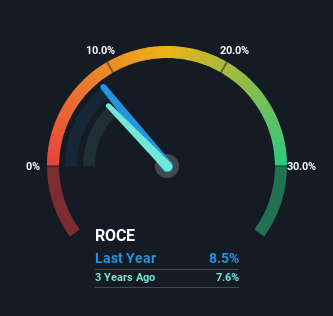- Japan
- /
- Trade Distributors
- /
- TSE:3388
Returns On Capital At Meiji Electric IndustriesLtd (TSE:3388) Paint A Concerning Picture

What are the early trends we should look for to identify a stock that could multiply in value over the long term? Ideally, a business will show two trends; firstly a growing return on capital employed (ROCE) and secondly, an increasing amount of capital employed. Basically this means that a company has profitable initiatives that it can continue to reinvest in, which is a trait of a compounding machine. In light of that, when we looked at Meiji Electric IndustriesLtd (TSE:3388) and its ROCE trend, we weren't exactly thrilled.
Return On Capital Employed (ROCE): What Is It?
If you haven't worked with ROCE before, it measures the 'return' (pre-tax profit) a company generates from capital employed in its business. To calculate this metric for Meiji Electric IndustriesLtd, this is the formula:
Return on Capital Employed = Earnings Before Interest and Tax (EBIT) ÷ (Total Assets - Current Liabilities)
0.085 = JP¥2.9b ÷ (JP¥52b - JP¥18b) (Based on the trailing twelve months to March 2024).
So, Meiji Electric IndustriesLtd has an ROCE of 8.5%. On its own, that's a low figure but it's around the 7.4% average generated by the Trade Distributors industry.
Check out our latest analysis for Meiji Electric IndustriesLtd

Historical performance is a great place to start when researching a stock so above you can see the gauge for Meiji Electric IndustriesLtd's ROCE against it's prior returns. If you'd like to look at how Meiji Electric IndustriesLtd has performed in the past in other metrics, you can view this free graph of Meiji Electric IndustriesLtd's past earnings, revenue and cash flow.
So How Is Meiji Electric IndustriesLtd's ROCE Trending?
On the surface, the trend of ROCE at Meiji Electric IndustriesLtd doesn't inspire confidence. To be more specific, ROCE has fallen from 20% over the last five years. However it looks like Meiji Electric IndustriesLtd might be reinvesting for long term growth because while capital employed has increased, the company's sales haven't changed much in the last 12 months. It may take some time before the company starts to see any change in earnings from these investments.
On a side note, Meiji Electric IndustriesLtd has done well to pay down its current liabilities to 34% of total assets. That could partly explain why the ROCE has dropped. Effectively this means their suppliers or short-term creditors are funding less of the business, which reduces some elements of risk. Some would claim this reduces the business' efficiency at generating ROCE since it is now funding more of the operations with its own money.
The Bottom Line On Meiji Electric IndustriesLtd's ROCE
In summary, Meiji Electric IndustriesLtd is reinvesting funds back into the business for growth but unfortunately it looks like sales haven't increased much just yet. Since the stock has gained an impressive 58% over the last five years, investors must think there's better things to come. Ultimately, if the underlying trends persist, we wouldn't hold our breath on it being a multi-bagger going forward.
Meiji Electric IndustriesLtd does have some risks, we noticed 2 warning signs (and 1 which doesn't sit too well with us) we think you should know about.
While Meiji Electric IndustriesLtd isn't earning the highest return, check out this free list of companies that are earning high returns on equity with solid balance sheets.
If you're looking to trade Meiji Electric IndustriesLtd, open an account with the lowest-cost platform trusted by professionals, Interactive Brokers.
With clients in over 200 countries and territories, and access to 160 markets, IBKR lets you trade stocks, options, futures, forex, bonds and funds from a single integrated account.
Enjoy no hidden fees, no account minimums, and FX conversion rates as low as 0.03%, far better than what most brokers offer.
Sponsored ContentNew: Manage All Your Stock Portfolios in One Place
We've created the ultimate portfolio companion for stock investors, and it's free.
• Connect an unlimited number of Portfolios and see your total in one currency
• Be alerted to new Warning Signs or Risks via email or mobile
• Track the Fair Value of your stocks
Have feedback on this article? Concerned about the content? Get in touch with us directly. Alternatively, email editorial-team (at) simplywallst.com.
This article by Simply Wall St is general in nature. We provide commentary based on historical data and analyst forecasts only using an unbiased methodology and our articles are not intended to be financial advice. It does not constitute a recommendation to buy or sell any stock, and does not take account of your objectives, or your financial situation. We aim to bring you long-term focused analysis driven by fundamental data. Note that our analysis may not factor in the latest price-sensitive company announcements or qualitative material. Simply Wall St has no position in any stocks mentioned.
Have feedback on this article? Concerned about the content? Get in touch with us directly. Alternatively, email editorial-team@simplywallst.com
About TSE:3388
Meiji Electric IndustriesLtd
Imports, exports, and sells electrical devices, measuring instruments, electrical equipment, and automation and energy-saving function components and equipment.
Flawless balance sheet established dividend payer.
Market Insights
Community Narratives




